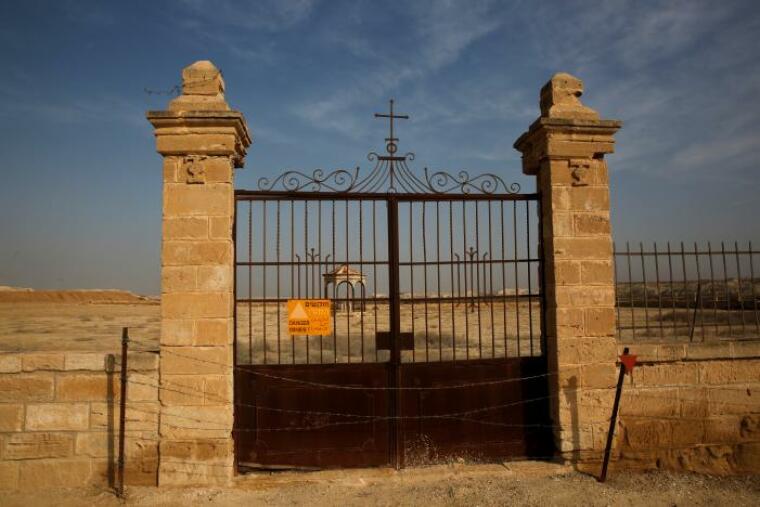Churches near Jordan River to be cleared of land mines

Pilgrims will be able to visit the churches on the western bank of the Jordan River soon after the area is cleared of booby-traps and land mines.
The Halo Trust, a Scottish-based charity that has cleared minefields across the globe, is raising $4 million to make the site safe for visitors.
The river banks were littered with thousands of mines when Israel and Jordan were at war. The two nations made peace in 1994, but many years have passed before mine clearing began.
While the Gospel of John refers to "Bethany beyond the Jordan" without further details, both nations have claimed that John the Baptist met Jesus on their side of the river. In an attempt to bolster its claim, Jordan opened its site in 2002, showing remains of ancient churches and writings of pilgrims down the centuries. It was declared as a World Heritage Site by UNESCO In 2015.
The site in the West Bank, which was opened in 2011, has more visitors than the Jordanian site, but its churches remain off-limits to pilgrims.
The Halo Trust stated that it would take two years to clear the small churches along 100 hectares (247 acres) of land that belongs to Roman Catholic and Eastern Orthodox churches. The charity noted that the Israeli, Jordanian and Palestinian authorities have expressed their support for the project.
Christians already flock to be baptized on the cleared area at Qasr al-Yahudi, which is about a kilometer (half-mile) away from the mined area. In recent years, on the Jordanian side of the river, where Christians also conduct baptisms, several churches from different sects have been built to welcome pilgrims.
"Over 450,000 tourists from all over the world come to visit this site every year and Halo believes that after (the church area) is cleared and rebuilt, the local economy will benefit," Halo's West Bank project manager Ronen Shimoni told Reuters.
Last week, about 4,000 Catholics attended a special mass on the Jordanian side of the river in an annual pilgrimage to the site.
"This is a religious and national holy day, the anniversary of the baptism of Jesus Christ," Archbishop Maroun Lahham, Patriarchal Vicar for Jordan, told the worshippers, according to AFP.
According to Halo, some of the seven church buildings were boobytrapped by Israel after it captured the West Bank in the 1967 war. The bombs were planted to help secure its frontier against infiltration from Jordan.
"We are expecting to find around 4,500 targets. Most are anti-tank mines, but there are also anti-personnel mines and a few hundred unexploded ordnances, abandoned explosives, and improvised devices inside the churches," said Michael Heiman of Israel's Defence Ministry.
 Christians don't have to affirm transgenderism, but they can’t express that view at work: tribunal
Christians don't have to affirm transgenderism, but they can’t express that view at work: tribunal Archaeology discovery: Medieval Christian prayer beads found on Holy Island
Archaeology discovery: Medieval Christian prayer beads found on Holy Island Presbyterian Church in America votes to leave National Association of Evangelicals
Presbyterian Church in America votes to leave National Association of Evangelicals Over 50 killed in 'vile and satanic' attack at Nigerian church on Pentecost Sunday
Over 50 killed in 'vile and satanic' attack at Nigerian church on Pentecost Sunday Ukrainian Orthodox Church severs ties with Moscow over Patriarch Kirill's support for Putin's war
Ukrainian Orthodox Church severs ties with Moscow over Patriarch Kirill's support for Putin's war Islamic State kills 20 Nigerian Christians as revenge for US airstrike
Islamic State kills 20 Nigerian Christians as revenge for US airstrike Man who served 33 years in prison for murder leads inmates to Christ
Man who served 33 years in prison for murder leads inmates to Christ


 Nigerian student beaten to death, body burned over ‘blasphemous’ WhatsApp message
Nigerian student beaten to death, body burned over ‘blasphemous’ WhatsApp message 'A new low': World reacts after Hong Kong arrests 90-year-old Cardinal Joseph Zen
'A new low': World reacts after Hong Kong arrests 90-year-old Cardinal Joseph Zen Iran sentences Christian man to 10 years in prison for hosting house church worship gathering
Iran sentences Christian man to 10 years in prison for hosting house church worship gathering French Guyana: Pastor shot dead, church set on fire after meeting delegation of Evangelicals
French Guyana: Pastor shot dead, church set on fire after meeting delegation of Evangelicals ‘Talking Jesus’ report finds only 6% of UK adults identify as practicing Christians
‘Talking Jesus’ report finds only 6% of UK adults identify as practicing Christians Mission Eurasia ministry center blown up in Ukraine, hundreds of Bibles destroyed: 'God will provide'
Mission Eurasia ministry center blown up in Ukraine, hundreds of Bibles destroyed: 'God will provide' Church holds service for first time after ISIS desecrated it 8 years ago
Church holds service for first time after ISIS desecrated it 8 years ago Burger King apologizes for 'offensive campaign' using Jesus' words at the Last Supper
Burger King apologizes for 'offensive campaign' using Jesus' words at the Last Supper Uganda: Muslims abduct teacher, burn him inside mosque for praying in Christ’s name
Uganda: Muslims abduct teacher, burn him inside mosque for praying in Christ’s name